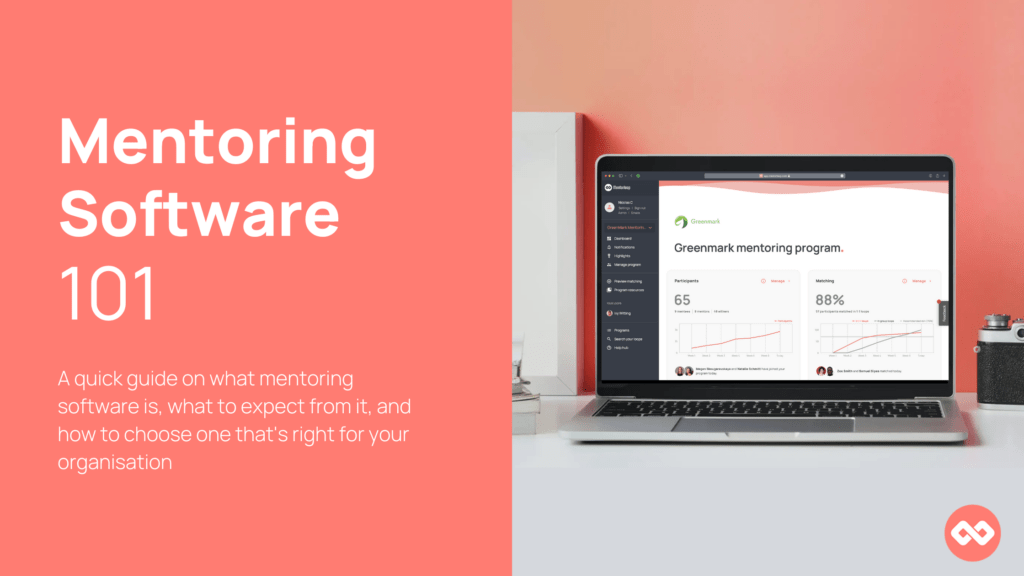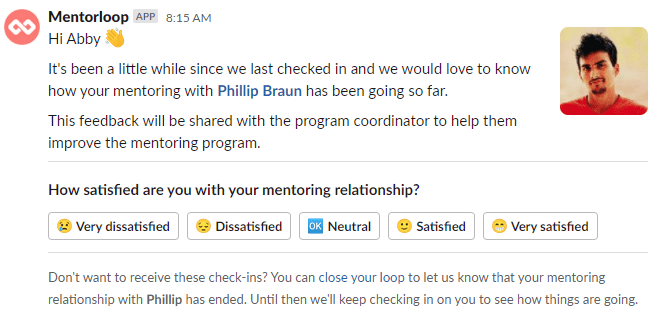Are you running or planning to run a mentoring program without mentoring software? Or maybe just curious to see what mentoring software is actually for? Are you unsure about what you should expect to find in mentoring software or need help deciding which one is right for you?
In this post, we demystify what mentoring software really is, how to decide whether mentoring software is right for you and your program, and how you can get started.
Let’s get to it.

What Is Mentoring Software?
Mentoring Software is a platform that facilitates easier management of a mentoring program by streamlining time-consuming administrative jobs. It typically assists with tasks such as matching and managing participants, providing resources, collecting feedback, tracking progress, and reporting, among others.
What Key Features Should Mentoring Software Have?
Any mentoring software needs to make admin easy for program coordinators. That usually translates to a standard list of features that more or less fall under these categories:
- Participant Management
- Matching
- Momentum Management
- Support and Resources
- Analytics and Reporting
- Integrations
Depending on which software you go with, there may be differences.
With Mentorloop, you get all of these features and more.
Participant Management 🗂
Instead of manually adding participants, their contact info, matching notes, etc. onto a spreadsheet, mentoring software simplifies this process. This is done by either allowing participants to apply and fill out profiles by themselves or a simple upload of an employee contact list.
Matching 🎯
Most, if not all, mentoring software will have ways to simplify this process for you. It can be through an algorithm that matches your cohort based on certain criteria, or allowing your cohort to Self Match.
Mentorloop’s truly equitable matching algorithm is like no other. While other matching algorithms pair participants individually, often producing a score (eg. 90%), Mentorloop considers and analyses your entire cohort to ensure every individual receives an equitable match. Based on pairing over 50,000 matches, Mentorloop’s smart match has maintained a satisfaction rating above 96%.
Momentum Management 🚀
Many mentoring software options will also have tools to help you maintain your program’s momentum in various ways. Mentorloop helps you keep your participants engaged through automated emails, in-app messaging, and/or notifications.
The “Milestones” Journey on Mentorloop guides your participants as they move through their mentoring journey. Mentorloop takes a step up from just providing mentors and mentees with a static library. Instead, Mentorloop surfaces personalised resources for participants depending on where they are in their mentoring journey, nudging them gently in the right direction.
Support and Resources 📚
Mentorloop’s vast and ever-growing Resource Centre of everything mentoring is accessible to you and your cohorts. Our HelpHub is also full of easy-to-follow tips in case someone has any difficulty.
And for the Program Coordinator, Mentorloop also has tons of resources to guide you in managing every aspect of your program. From getting started, marketing your program, recruiting participants, and all the way to relaunching a program or scaling a pilot, we’ve got everything you need to help you run your best mentoring program yet.
Analytics and Reporting 📊
No program coordinator wants to be manually doing their metrics, especially for a large program! So most mentoring programs will have some form of reporting data made available to you.
Mentorloop’s Sentiment Feedback Analysis System feeds quantitative and qualitative information to your Program Dashboard. This gives you live, real-time data on how individuals and mentoring pairs are faring, as well as the health of your entire cohort. This removes the need to wait until the conclusion of the program to perform a survey. This also allows programs to be ‘always on’, embedding a culture of mentoring in your organisation.
With Mentorloop’s detailed analytics and reporting tools, you gain insight into the effectiveness of your program. This allows you to make data-driven decisions to improve your program over time. Mentorloop also gives you more than just “vanity metrics”. Instead, Mentorloop measures the quality of the relationships within a program and whether your participants’ mentoring relationships are giving them value.
Integrations 📲
Your mentoring software should adjust to the way you work, not the other way around. With seamless sign-ups, frictionless scheduling, the ability to set availabilities on your preferred calendars, and many other features, Mentorloop’s integrations weave mentoring into your ecosystem instead of making you adjust to how the platform works.
But wait, there’s more! Here at Mentorloop, we like to offer more than your stock-standard features. 😉
Go for Flexibility 🤸🏼
Users can access Mentorloop in many ways—via desktop, or on your tablet or phone via the Mentorloop app. So wherever you are, you’re able to communicate with your mentoring partner, or access your goals, tasks, and notes.
Mentorloop also integrates with many of the tools that you and your people already use. Never worry about app fatigue, or missing meetings or notifications again!
Our Commitment to Building ‘Personal Advisory Boards’ 🧍🏿♀️🧍🏻♂️🧍🏻♀️🧍🏽♂️
Unlike other mentoring platforms, Mentorloop will never limit the mentoring potential of an individual by billing by the number of mentoring relationships within a program. The number of mentoring relationships an individual can access with Mentorloop will always be unlimited. This allows participants to access multiple mentoring relationships to satisfy a variety of interests and needs.
Choose B Corp Certified! 🌏
Mentorloop is the first mentoring software provider in the world to obtain a B Corp certification, being certified since its inception in 2016. That means we’ve been certified by the nonprofit B Lab to meet rigorous standards of social and environmental performance, accountability, and transparency.
At Mentorloop, we take our B Corp certification seriously, making sure our ethics and values underpin everything we do. We want Mentorloop to be a tool for positive change and our B Corp certification is a way for us to state this intention and hold ourselves accountable.
Here’s program coordinator Nikki Scheuder sharing why they decided to choose Mentorloop to run their award-winning mentoring program at Arup.
Mentorloop has many other features that allow you to build, maintain, and manage the momentum of your program, customise your program, manage your participants etc., just as other software have their own. It’s important to keep in mind what’s useful to you when choosing which one to go with.
Why do I need mentoring software?
When building a mentoring program, the focus early on is usually why a mentoring program is needed and the benefits for the organisation. But anyone who has ever run a program before will tell you that the work involved becomes an issue pretty quickly. The admin burden – managing the matching, troubleshooting, measuring, reporting, etc. – on top of the current workload of the coordinator, can be a lot. That’s what mentoring software is brilliant at and why it’s not just a nice-to-have when you’re running a program (especially large or multiple ones), but instead, a must-have.
But you don’t have to take it from us! Here are the award-winning mentoring program coordinators at nib to tell you why they decided that mentoring software was something they needed.
Keen to hear more from this chat? Get access to the full webinar:
Deciding if mentoring software is right for you
Before investing in mentoring software, there are several factors to consider whether it is the right choice for your program. While mentoring software can provide many benefits, it may not be necessary for all mentoring programs.
So let’s discuss where we draw the line based on previous experience and customers we have worked with and look at the key considerations to help you decide whether mentoring software is right for your organization and program.
How many participants will your mentoring program have?
If your mentoring program is relatively small, with only a few individuals involved, you may not need the added functionality that mentoring software provides. However, if your program is larger, mentoring software can help you manage the process more efficiently.
We recommend exploring the use of mentoring software for 40+ mentoring program participants – or around 20 mentor-mentee pairings.
Why 40? Because at 40 people, things start to get messy, time-consuming, and inconsistent when conducted manually. The onboarding and matching parts of the mentoring program (pre-mentorship) start to become very admin intensive – while communicating with participants and keeping track of the program becomes almost impossible.
Many of our customers start their programs at the 40-50-person mark and scale as they see positive outcomes and increased demand. And while a program with 10 to 20 participants might be managed very well with spreadsheets and emails, at 100 participants, it can become overwhelming to manage and track each participant’s progress and communication.
And let’s not even consider doing this manually with 500 to 1000 participants. 🫠
Do you envision scaling your mentoring program?
Another major reason for deploying mentoring software is that mentoring is becoming an increasingly important facet of your organisation’s toolbelt, whether that is for new hire training, learning and development, or inclusion purposes.
Mentoring programs earmarked for expansion will benefit greatly from the tools that mentoring software comes with. Program coordinators will find that managing a mentoring program effectively at scale is nearly impossible without mentoring software. So if this is the case with your program, find a specialised tool so you can effectively and efficiently offer mentoring to more of your employees, students, or members.
If your mentoring program is currently at 10 pairs but you plan on scaling it to 50 or 100 more pairs, then you might as well become acquainted with mentoring software during your pilot and utilise all of its benefits now – as it is going to be completely necessary moving forward. Once the benefits and results of mentoring are taking root, scaling these benefits will be as simple as sending out an invite to a list or uploading a file.
Want to learn how to build a scalable pilot mentoring program? Watch this video:
As your program grows, mentoring software like Mentorloop can help you keep track of all participants, monitor progress, and ensure that everyone is getting the support they need.
If you plan to expand your program different locations or time zones, then software becomes even more of a must-have. It can provide a platform for participants to communicate and collaborate with each other even if they are in different parts of the world, and for you to keep track of their progress and provide support.
Do you have mentoring program expertise?
If you aren’t quite sure how to build an effective mentoring program, then it’s best to employ the help of mentoring software.
Mentoring programs are tough; they involve a lot of coordination and preparation, and they impact your people directly. They are something you really do want to get right (or at least very close to right). And if you’re a first-time program coordinator, it can be daunting.
Mentoring software provides an instant framework for your program. It comes with everything you need to get your program from start to finish – straight out of the box. All of the onboarding and participant management tools; all of the matching tools; all of the resources and content; all of the momentum management tools, and all of the measuring and tracking capabilities. In essence, after some initial work, your great mentoring program builds itself!
But what if you already have experience running a mentoring program?
You may have developed many of the skills necessary to manage the process efficiently. But even the most experienced mentoring program managers can benefit from the tools that mentoring software provides. This is especially true when dealing with a large cohort. With mentoring software, program coordinators can be even more efficient with admin and free up time to focus on providing the best possible experience for participants.
Pro Tip: If you’re running a large program for the first time and need support, check out Mentorloop Enterprise. On this plan, you get access to expert strategy sessions with our Mentoring Specialists to help you run the best mentoring program that aligns with your goals.
Do you have any spare time?
As we’ve learned in years of working with mentoring program coordinators, a lot of them aren’t mentoring program coordinators by trade. This means that starting and running a mentoring program is not their core competency. It also means that it isn’t supposed to command a significant portion of their time.
However, managing a mentoring program can be incredibly time-consuming, and therein lies the problem. For this reason, many L&D, HR, or diversity and inclusion professionals who run mentoring programs choose to assess the high opportunity cost of managing the program and opt to buy a software platform that takes care of all the manual and time-intensive tasks.
Mentorloop streamlines your sign-up process and participant management, enables you to match your participants in a fraction of the time it would take you otherwise, allows you to gather feedback to more effectively and efficiently guide your cohort through their mentoring journeys, and even ensures your data is actionable and ready for sharing to your stakeholders.
So once you’ve got your program set up with Mentorloop, it’s simply a matter of maintaining oversight and getting your everyday work done.
Do you want to track and measure mentoring program success?
Measurement has been a historical weakness of the organisational mentoring program. Organisations love the premise and perceived results of mentoring but struggle to quantify them in an ROI-like fashion. This is where software becomes invaluable, especially with large programs. The inputs of mentoring can be measured and analysed – as can the outputs.
Mentoring software enables you to capture program engagement (even communication via email) and general program health, which is impossible without software.
If you’re keen to learn about how Mentorloop measures program success, watch these videos:
Can I just use my HRIS for this?
You might use an HRIS platform that comes with a mentoring element and have thought, “I can just use this! Job done!” And sure, you could do that, but as it is for many solutions in life – pants, shampoo, bathing suits, you name it – often these ‘one-size-fits-all solutions’ come with the heftiest price tag of them all: a poor experience.
The one-size-fits-all trap will unfortunately punish you in three ways:
- Mediocre User Experience
- Expected Obsolescence
- Compromised Performance
With a tailored mentoring solution, you can expect regular updates of interactive features, content, support articles and guidance. A concentrated effort and dedication to moving alongside and even guiding mentoring trends, ensures you always have access to the best experience and innovation available for your people.
Ironically, but worth noting, this also translates to mentoring itself, where often having only one mentor is not ideal. It’s no secret that being open to a variety of lived experiences, perspectives and networking opportunities is proven to enhance careers.
How your HRIS Is Holding Your Mentoring Efforts Back
Trap 1: Failing to uncover the unlikely connection (matching)
Running an open program where participants self-select their mentoring partner is often far more engaged than those created in a stale HRIS environment due to one crucial, secret ingredient – intention.
Platforms like Mentorloop empower participants to take control of their experience, pausing or resuming as needed, fostering genuine, mutual connections. This allows the creation of an environment where participants can be confident that those they’re reaching out to, are genuinely looking for connection and support.
For algorithm-matched programs, capturing meaningful information is essential. While HRIS records may track skills, they rarely reflect people’s personal goals or aspirations. Mentoring platforms provide a unique space for participants to define their development journey and seek guidance aligned with their ambitions.
Further to this, an equitable approach is vital here. In a remote world, equity is even more important. What role does equity and equality play in your mentoring program? Do you have access to an algorithm that constantly learns from mentoring insights collected from thousands upon thousands of people worldwide?
Trap 2: Getting stuck in the ‘old way’ of mentoring (momentum)
When you’re running a mentoring program or initiative using a HRIS, don’t hold your breath when it comes to support and resources for both you and your participants. With a dedicated solution like Mentorloop, you’ll be covered from day one to educate and inspire every participant on their mentoring journey – particularly if they’re not starting at the same time.
There are mentoring attitudes and habits that are best left in the past and we’re well beyond as a broader society – here, we’re talking about mentoring favouring the bold, those who are chosen, considered high-potentials or seen to be a younger version of a mentor’s self.
Due to these biases and challenges, most programs run through a HRIS are run poorly and only offer mentoring to a select few – reinforcing the same people moving into positions of influence and perpetuating DEI issues.
With a mentoring platform like Mentorloop, you can be assured that everyone is accounted for, considered and set-up for success across the lifecycle of their own mentoring journey, moving through milestones and visible to you, the Program Coordinator.
Trap 3: Limitations and blind spots in measuring success (measure)
Measuring a mentoring program can be tough, especially with spreadsheets, limited tools, or waiting until the end to gather feedback.
Mentorloop simplifies this by capturing real-time Sentiment at key moments, helping address issues as they arise. This data feeds into the Mentoring Quality Score (MQS), allowing you to track success both at a macro level and with individual participants.

Trap 4: Missing out on the benefits of scalability and accessibility (grow)
Often, the Program Coordinator of a mentoring program isn’t actually in the HR or People & Culture team and it might be inappropriate for them to have access to a certain level of HR data that they need to make matches.
By reserving a dedicated space for mentoring that sits outside the HRIS sphere, this creates a more open place for participants to engage and welcome one another. As a Program Coordinator, you can make a conscious effort to include certain communities within your organisation and ensure they have dedicated support along their journey.

Keen to learn more about how Mentorloop can ease the admin burden of running a mentoring program?
You can get your program started in just three easy steps:




